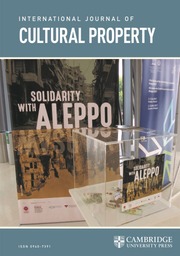Article contents
Ownership and transmission in contemporary dance and beyond: A short introduction to the special issue
Published online by Cambridge University Press: 20 December 2022
Abstract
The aim of this special issue is the investigation and contextualization of specific arts practices for what they can show us about the transmission and ownership of knowledge. Our authors make explicit the modes of sharing that are part of the creative process in contemporary dance and in Irish traditional music and examine the principles of transmission and social mores that allow ideas to move between practitioners. This introduction sets out some context for the issue and our approach, which is to work alongside practitioners to understand and reveal the social principles and expectations of ownership that are part of the process of producing these art forms.
- Type
- Article
- Information
- Copyright
- © The Author(s), 2022. Published by Cambridge University Press on behalf of the International Cultural Property Society
References
- 1
- Cited by



